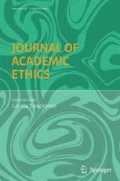Abstract
Universities are facing a critical challenge; university citizenship has steadily declined over the last few decades. As a self-governing entity, most of the foundational elements of a university community are within its own control. As a result, the health and future welfare of the institution depends greatly on the quality of its leaders and robustness of its governing structure. These in turn depend on the quality of those undertaking leadership roles and serving on governing bodies and on the degree to which they reflect its values and aspirations. Maximising the probability that these desiderata will be achieved requires a broad-based faculty willingness to serve conscientiously on these bodies and to serve as administrators to be involved in selecting members, and to be involved on the myriad of sub-committees, task forces, departmental committees, and the like. It is not only an abdication of citizenship to leave governance and administration of the institution to a few willing faculty, it is dangerous and puts at risk the welfare of the institution. Even if these few were all able to place the welfare of the institution above their own particular agendas and their self-interest (not something on which to count), the process of self-selection could not be expected to result in a group that would adequately reflect, represent or understand the breadth and depth of the needs, aspirations and complex circumstances of the entire institution. The larger the pool of willing participants, the greater the probability that those selected will reflect best the institutional diversity. This paper draws out the rights and obligations of faculty citizens embedded in the structural arrangements common to universities in the western world. In part A we examine three fundamental components of those arrangements, components that collectively define certain rights and entail certain obligations of citizenship. These obligations flow in part from essential rights, and also in part from what is necessary to sustain the viability and vibrancy of the community. In Part B, we examine some of these essential obligations of citizenship. In Part C, we make recommendations about how to promote effective citizenship; these recommendations are collected after Part C under the heading “Recommendations.”
Similar content being viewed by others
References
Boyer, E.L. (1990). Scholarship Reconsidered: Priorities of the Professoriate. Princeton: Princeton University Press.
Beiner, R. (1994).(ed.), Theorizing Citizenship. Albany: SUNY.
Bradley, F.H. (1876). Ethical Studies. Oxford: Oxford University Press.
Brandt, R.B. (1962).(ed.), Social Justice. Englewood Cliffs: Prentice Hall.
Clarke, P.B. (1994).(ed.) Citizenship. London: Pluto.
De George, R.T. (1997). Academic Freedom and Tenure: Ethical Issues. Lanham, Maryland: Rowman and Littlefield.
Dworkin, R.M. (1978). Taking Rights Seriously. London: Duckworth.
Hughes, G.E. (1944). Motive and duty, Mind 53, 314–331.
Kennedy, D. (1977). Academic Duty. Cambridge: Harvard University Press.
Kymlicka, W. and Norman, W. (1999). Return of the citizen: A survey of recent work on citizenship theory. Ethics.
Locke, J. (1690). Two Treatises of Government. Harmonsworth: Penguin (1964).
Meldon, A.I. (1974). Rights and Persons. Oxford: Blackwells.
Prichard, H.A. (1949). Moral Obligations. Oxford: Oxford University Press.
Raphael, D.D. (1967). Political Theory and the Rights of Man. London: Macmillan.
Rosovsky, H. (1998). A neglected topic: Professional conduct of college and university teachers, In William Bowen and Harold Shapiro (Eds.), Universities and their Leadership, Princeton: Princeton University Press.
Rosovsky, H. (2001). Some thoughts on university governance, In Werner Hirsch and Luc Weber (Eds.), Governance in Higher Education: The University in a State of Flux.
Rousseau, J.J. (1762). The Social Contract. Harmondsworth: Penguin (1984).
Simpson, E. (2003). The faculty of the future, Journal of Academic Ethics 1, 49–58.
Simpson, E. (2004). The leadership of service, Journal of Academic Ethics 2, 199–207.
Thompson, P. (2005). The accountability of academic leaders within and without the academy, Journal of Academic Ethics 2, 187–197.
Waldron, J. (1984).(ed.), Theories of Rights. Oxford: Oxford University Press.
White, A.R. (1984). Rights. Oxford University Press.
Author information
Authors and Affiliations
Corresponding author
Rights and permissions
About this article
Cite this article
Thompson, P., Constantineau, P. & Fallis, G. Academic Citizenship: An Academic Colleagues’ Working Paper. J Acad Ethics 3, 127–142 (2005). https://doi.org/10.1007/s10805-006-9010-8
Received:
Accepted:
Published:
Issue Date:
DOI: https://doi.org/10.1007/s10805-006-9010-8




